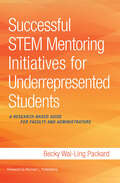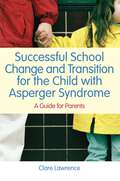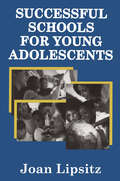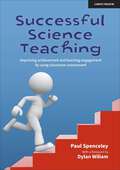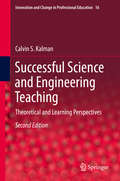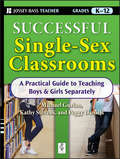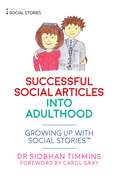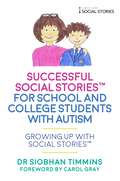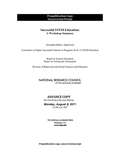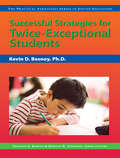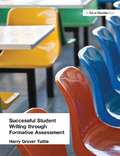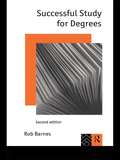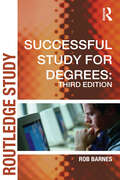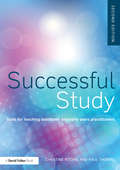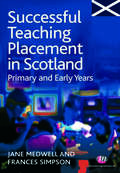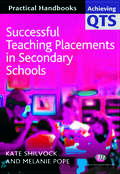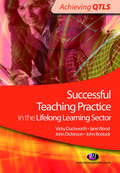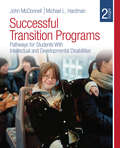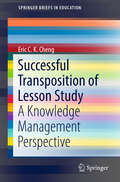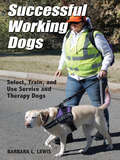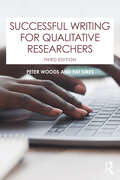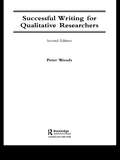- Table View
- List View
Successful STEM Mentoring Initiatives for Underrepresented Students: A Research-Based Guide for Faculty and Administrators
by Becky Wai-Ling PackardSuccessful STEM Mentoring Initiatives for Underrepresented College Students is a step-by-step, research-based guide for higher education faculty and administrators who are charged with designing mentoring programs to recruit and retain students from underrepresented groups. Written by an acknowledged expert in the field of STEM mentoring, the book constitutes a virtual consultant that enables readers to diagnose the issues they face, identify priorities, and implement appropriate practices to achieve their goals.The book describes the real and perceived barriers that underrepresented students—to include women, students of color, transfer students, and first-generation college students—encounter when considering enrollment, or participating, in science courses; considers the issues they face at the various transitions in their education, from entering college to declaring a major and moving on to a profession; and sets out the range of mentoring options available to program designers.By posing key questions and using three running case illustrations of common dilemmas, the book walks readers through the process of matching the best design options with the particular needs and resources of their own department or campus. Intentionally brief and to the point, the book is nonetheless a comprehensive guide to the full range mentoring models and best practices, that also covers issues of institutional and departmental climate and teaching methods, and offers insider insights to help designers avoid pitfalls as they create effective, sustainable mentoring initiatives.This guide will assist administrators working on new initiatives to broaden access and improve persistence and graduation in their programs, as well as apply for research grants, by clarifying objectives and identifying the effective evidence-based practices to achieve them. It also provides common conversation-starters for departments to identify obstacles to enrollment and broaden participation.
Successful School Change and Transition for the Child with Asperger Syndrome
by Clare LawrenceMoving to a new school can be a daunting prospect for the child with Asperger syndrome, and parents are often left feeling powerless to help prevent the anxiety and loss of confidence which may ensue. Clare Lawrence's new book provides parents of children with Asperger syndrome with practical advice on how to prepare their child for moving to a new school, and how to help make the transition as smooth as possible. A wide range of material is covered, including useful guidance on choosing the right school, supporting the child during the period prior to the move, and identifying and practising the different social rules and expectations of the new school. The strategies in the book can be adapted for children of all ages and include working out a transition time-line, identifying a named adult and 'safe haven' at the school, and effective communication between parents, teachers and support staff. This clear and accessible book will be an invaluable resource for parents of children with AS who are moving to a new school, and will also be of interest to the teachers and education professionals who work with them.
Successful Schools for Young Adolescents
by Joan LipsitzAt a time when the public, researchers, and policymakers are losing confidence in public schooling, this presentation of case studies of four schools offers solutions and concrete models of diverse ways in which excellence can be attained in middle-grade schools. Asking what "effectiveness" means for the young adolescent age group (a hitherto unexplored area in research literature), how effective schools come about, and how they achieve acceptance in their communities, Lipsitz identifies and examines successful middle-grade schools, noting that the major problem in schooling is meeting the massive individual differences in the development of early adolescents.
Successful Science Teaching: Improving achievement and learning engagement by using classroom assessment
by Paul SpenceleyTeachers simply do not have the time to do any more work. Yet the pressure to improve results is ever-upwards. The emphasis in this book is not on doing anything extra, but on doing all the everyday things that science teachers do – planning lessons, marking work and exams, providing feedback, and getting students involved in discussions, or self and peer-assessment – in a slightly different way. The book is full of simple, practical, formative assessment techniques and strategies, based on real classroom practices, repeated across the range of ages and abilities at secondary levels, in a variety of schools, that have been repeatedly shown to significantly improve examination results, and student involvement in lessons. Whether you are just about to embark on a career as a science teacher, or you have been one for many years, there is bound to be something here.
Successful Science Teaching: Improving achievement and learning engagement by using classroom assessment
by Paul SpenceleyTeachers simply do not have the time to do any more work. Yet the pressure to improve results is ever-upwards. The emphasis in this book is not on doing anything extra, but on doing all the everyday things that science teachers do – planning lessons, marking work and exams, providing feedback, and getting students involved in discussions, or self and peer-assessment – in a slightly different way. The book is full of simple, practical, formative assessment techniques and strategies, based on real classroom practices, repeated across the range of ages and abilities at secondary levels, in a variety of schools, that have been repeatedly shown to significantly improve examination results, and student involvement in lessons. Whether you are just about to embark on a career as a science teacher, or you have been one for many years, there is bound to be something here.
Successful Science and Engineering Teaching
by Calvin S. KalmanThe intent of this book is to describe how a professor can provide a learning environment that assists students to come to grips with the nature of science and engineering, to understand science and engineering concepts, and to solve problems in science and engineering courses. As such, this book is intended to be useful for any science or engineering professor, who wants to change their course to include more effective teaching methods, to instructors at post-secondary institutions, who are beginning their careers, and as a handbook for TA s. Since the book is based upon articles that I have had published in Science Educational Research and which are grounded in educational research that I have performed (both quantitative and qualitative) over many years, it will also be of interest to anyone engaged in research into teaching science and engineering at the post-secondary level. I have also tried to include enough background so that the book could be used as a textbook for a course in educational practice in science and engineering. The book has two main axes of development. Firstly, how do we get students to change their epistemology so that their outlook on the course material is not that it consists of a tool kit of assorted practices, classified according to problem type, but rather that the subject comprises a connected structure of concepts. Secondly, helping students to have a deeper understanding of science and engineering. "
Successful Single-Sex Classrooms
by Michael Gurian Kathy Stevens Peggy DanielsThis book is an essential resource for educators who are teaching or leading schools with single-gender classes, whether they're in public, private, or Catholic schools. It is a "soup-to-nuts" guide, covering everything from curriculum planning and classroom design to school policies and parent-teacher communication. Whether contemplating this new educational trend, or already working within one of the 12,000 single-gender schools, this practical guide shows educators how they can make the most of a unique educational opportunity. <P><P>Positioned at the forefront of brain-based learning, Michael Gurian's work translates and distills the latest scientific research into key points which can be immediately integrated into an educator's existing practice. The research underlines the importance of single-sex learning, and supports the creation and implementation of new strategies for accommodating the brain differences of boys and girls - at both the school and classroom level.
Successful Social Articles into Adulthood: Growing Up with Social Stories™
by Siobhan TimminsThe third volume in the Growing Up with Social Stories™ series is specifically devoted to developing a social understanding around some of the most common issues faced by autistic young adults. Topics include applying for a job, looking after physical and mental health, and staying safe in a new home.
Successful Social Stories™ for School and College Students with Autism: Growing Up with Social Stories™
by Carol Gray Siobhan TimminsAs children grow up and spend more and more time away from home in schools and colleges, life often seems to get increasingly complicated. Autism makes the challenges they meet in these new environments even more difficult to navigate. Social Stories™ is a highly regarded strategy that parents and teachers can use to help young people with autism understand the new social situations they face during this time. Writing an effective Story takes a special set of skills, and in this fully illustrated book Dr Siobhan Timmins explains how to acquire and hone these techniques and put them into practice. Following on from her book on writing Social Stories™ for young children, this book on the next age group up includes 160 illustrations and clear examples based on the author's own experiences of raising a son with autism. She explains how to identify the underlying issues, and articulate the key ideas so that young learners can find connections between Stories to build a greater understanding of relationships, the adult world and their own identity. The book is an invaluable guide to creating bridges between young people and the parts of life they find most difficult.
Successful Stem Education
by The National Academy of SciencesWhat students learn about the science disciplines, technology, engineering, and mathematics during their K-12 schooling shapes their intellectual development, opportunities for future study and work, and choices of career, as well as their capacity to make informed decisions about political and civic issues and about their own lives. Most people share the vision that a highly capable STEM workforce and a population that understands and supports the scientific enterprise are key to the future place of the United States in global economics and politics and to the well-being of the nation. Indeed, the solutions to some of the most daunting problems facing the nation will require not only the expertise of top STEM professionals but also the wisdom and understanding of its citizens. Although much is known about why schools may not succeed, it is far less clear what makes STEM education effective. Successful STEM Education: A Workshop Summary discusses the importance of STEM education. The report describes the primary types of K-12 schools and programs that can support successful education in the STEM disciplines and examines data and research that demonstrate the effectiveness of these school types. It also summarizes research that helps to identify both the elements that make such programs effective and what is needed to implement these elements.
Successful Strategies for Twice-Exceptional Students
by Kevin D. BesnoySome kids, including gifted students, have difficulties in school. Gifted students with learning disabilities may continuously struggle with certain areas of instruction, but never receive identification of or accommodation for their difficulties, because their gifts mask their disabilities. Gifted students with learning disabilities need unique instruction and a practical use of accommodations to succeed in school. It is important for educators to familiarize themselves with the definitions and characteristics of various learning disabilities, and learn the strategies they can use in the classroom to help gifted/learning-disabled students succeed. In this book, Kevin Besnoy takes an in-depth look at the various learning disabilities and difficulties some gifted students face, provides practical tips for accommodating and planning instruction for those students, and gives an overview of federal law related to this population. This is one of the books in Prufrock Press' popular Practical Strategies Series in Gifted Education. This series offers a unique collection of tightly focused books that provide a concise, practical introduction to important topics concerning the education of gifted children. The guides offer a perfect beginner's introduction to key information about gifted and talented education.
Successful Student Writing through Formative Assessment
by Harry Grover TuttleUse formative assessment to dramatically improve your students’ writing. In Successful Student Writing Through Formative Assessment, educator and international speaker Harry G. Tuttle shows you how to guide middle and high school students through the prewriting, writing, and revision processes using formative assessment techniques that work. This brand new set of strategies includes real writing samples plus easy-to-use applications that will allow you to monitor, diagnose, and provide continual feedback to your students. You'll help them perfect their written communication skills and ready them for further growth. Tuttle offers tips on breaking large writing assignments into several smaller tasks, identifying red flags, varying your feedback methods, and more. Enhance your instruction by assessing students at specific points throughout the writing process, and help them to become better writers as a result!
Successful Study for Degrees
by Rob BarnesSuccessful Study for Degrees is a practical guide to studying more effectively at first and higher degree levels. Aimed particularly at students looking for more than just a basic study skills book, it blends practical ideas with sound principles, and is structured so that topics such as basic essay writing feed into chapters on dissertation preparation and writing. It uses many examples drawn from interviews conducted with students and lecturers from a range of disciplines. At a time when many arts-based courses are changing in structure, particular attention is given to research-based study, which in many cases is replacing the traditional formal examination. At undergraduate level, the book gives practical guidance on reading, seminars and questioning techniques; at higher degree level, it discusses issues such as validity, reliability and meaning. The book also offers techniques of questioning to promote higher level thinking, including explorations of ways in which argument is constructed and explanations of commonly-used terms such as proposition, premise, assertion and evidence.
Successful Study for Degrees
by Rob BarnesThis is a practical guide to studying more effectively at first and higher degree levels. Primarily for students looking for more than just a basic study skills book, it blends practical ideas with sound principles to offer a readily accessible, handy guide.This third edition includes a new chapter on distance learning and updated chapters about online and computer-based learning, in addition to essential advice on: personal survival in the university setting developing a good learning attitude using ebooks, online searcher and electronic media time management, deadlines and task management essay technique and writing your dissertation small-group and seminar study. Packed with useful information and guidance, this is an indispensable read for any student in higher education.
Successful Study: Skills for teaching assistants and early years practitioners
by Paul Thomas Christine RitchieSuccessful Study is an essential guide for students embarking upon an education related Foundation Degree without previous study experience. The world of study at university can be a daunting and bewildering place for new students unfamiliar with the academic processes such as writing essays and presenting portfolios. This book offers clear and straight-forward explanations of how to prepare for study, how to work at higher education level and how to tackle assignments. Covering all aspects of educational study, and based on the experiences of real education professionals, this new edition has been fully updated to include: Clear links to work-based practices throughout Advice for students with disability Guidance on using e-resources Tips for managing your learning and increasing motivation How to think critically Reflective practice With case studies, tasks and opportunities for reflection, this accessible book has been specifically designed for those on Teaching Assistant, Early Years or related Foundation Degrees and will be an essential resource for those wanting to find the answers to study questions quickly and easily.
Successful Teaching 14-19: Theory, Practice and Reflection
by Dr Gerry Czerniawski Warren KiddAre you looking for a complete training manual, to get you through your assignments, help you on your teaching practice and support you in your first teaching job? For trainee teachers studying to teach the 14 to 19 age group in secondary schools and colleges, this book is a practical guide covering the essential skills that must be acquired in order to successfully complete your course. Five sections cover education policy, professional skills, theory, practice and reflection. The authors provide teaching ideas that work, and that will help trainee teachers to improve their grades and lesson observation profiles. There is a clear explanation of the theoretical underpinning that must be grasped in order to pass written assignments, and Masters level debates are addressed throughout the book, with a dedicated chapter exploring academic themes and issues. The book is packed with ideas for classroom activities, and popular topics covered include: - essential educational theory - behaviour and classroom management - how to start off lessons - ideas for group work - setting homework - evaluating your own practice, and understanding how you can improve - revising for exams - working as part of a team - using technology All the chapters contain learning objectives, discussion points, examples from practice, Masters level extensions (for those studying at that level) and suggestions for further reading. Suitable for all those studying to teach the 14 to 19 age range, this book is ideal for those on Secondary PGCE, PGDE and GTP courses leading to QTS, those studying for the post-compulsory sector PTLLS, DTLLS and CTLLS qualifications and those doing Overseas Teacher Training and Teach First courses. Warren Kidd and Gerry Czerniawski are former teachers with experience of working in diverse settings; they are both Senior Lecturers in the Cass School of Education, University of East London. Read Warren Kidd's blog: here
Successful Teaching Placement Primary and Early Years
by Mary Briggs Jane Medwell Julie Neale Nigel Palmer George RaperSchool placements can be anxious and uncertain experiences for trainee teachers, and even for those with previous classroom experience a new school environment can be intimidating. This book is full of invaluable advice and practical suggestions that will help trainees prepare for, enjoy and make the most of this experience. It deals with the full range of issues, from finding out about the placement school to managing difficult behaviour on placement. This second edition is linked to the 2007 Standards for QTS and reflects recent documents and initiatives.
Successful Teaching Placement in Scotland Primary and Early Years (Books for Scotland Series)
by Frances Simpson Jane A MedwellThe majority of ITE students in Scotland are postgraduates with only one year to grasp the vast skills and knowledge required to become a primary teacher. Therefore, for many, school placement is a source of stress and worry. This book combines the information and support that students need to help them prepare for, enjoy and maximise the benefits of teaching placements for their professional development. It has been specifically written for the education system in Scotland, taking full account of the differences in practice and terminology that make English books of little use to trainees in Scotland.
Successful Teaching Placements in Secondary Schools (Achieving QTS Practical Handbooks Series)
by Kate Shilvock and Melanie PopeProfessional teaching placements are an essential part of secondary teacher training, with trainees spending around two thirds of their time in schools. This practical handbook helps trainees fully prepare for their school experience, offering the guidance and reassurance to ensure they are confident and successful during placement. It is full of invaluable advice and practical suggestions, with clear links to the Professional Standards for QTS throughout.
Successful Teaching Practice in the Lifelong Learning Sector (Achieving QTLS Series)
by John Dickinson Vicky Duckworth Jane Wood John BostockThis book provides clear guidance on how to approach initial teaching experience, how to plan effective sessions, how to work well with your mentor and how to make the most out of your new career. Through focusing on the real-life experiences of both in-service and pre-service trainee teachers, it offers the opportunity to reflect on and learn from an array of diverse teaching practice experiences from a wide range of vocational areas including construction, hair and beauty, Early Years, psychology, performing arts, law, English, Skills for Life and engineering.
Successful Transition Programs: Pathways for Students With Intellectual and Developmental Disabilities (Second Edition)
by Michael L Hardman John McDonnellAddressing the full range of curricular and instructional issues that face professionals working in middle school, high school, and post-high school programs, Successful Transition Programs: Pathways for Students With Intellectual and Developmental Disabilities, Second Edition is the most relevant text available for teachers and administrators. Authors John McDonnell and Michael L. Hardman take the position that the most effective transition programs are those that cumulatively build on the capacity of students for employment, community living, and citizenship.
Successful Transposition of Lesson Study: A Knowledge Management Perspective (SpringerBriefs in Education)
by Eric C. ChengThis book analyses the organisation cultures that promote Japanese Lesson Study, identifies the soul of lesson study, which is missing in other cultures, and discusses the conditions for successfully transplanting the Lesson Study to other cultures. Adopting Nonaka and Tateuchi’s (1995) SECI knowledge creation model as the analytical lens, it explores the tacit and explicit knowledge convention and creation processes in lesson study. Unpacking the mechanism of the knowledge management process and practices could assist policy makers and school administrators, educators in contextualising lesson study to their school systems. The book provides an accessible discussion of the benefits and challenges of introducing lesson study, and presents three new research dimensions to analyse it: reviewing the historical development of lesson study in terms of the pendulum swings between professional accountability and state accountability in developing the school-based curriculum and the national curriculum; examining lesson study as a knowledge management tool for creating pedagogical knowledge for curriculum implementation: and studying the “kaizen kata” embedded in the PDCA cycles of lesson study as an organization routine for school improvement.
Successful Working Dogs: Barbara L. Lewis Select, Train, And Use Service And Therapy Dogs
by Barbara LewisThe last twenty years have seen an explosion of uses for working dogs. Service dogs are now asked to perform a variety of tasks for people with disabilities. And therapy dogs—once largely seen only at nursing homes—are now used for emotional support and motivation in schools, libraries, courts, universities, hospitals, churches and employee lounges. This book provides positive-motivation training techniques for basic manners and specific tasks expected of working dogs. Beyond training these animals, the reader can learn to evaluate both the suitability of a working dog and the suitability of the dog’s client. A final goal of this book is to help working dog owners, clients, and trainers—and dog owners in general—to understand the capabilities, needs and limitations of these dedicated animals.
Successful Writing for Qualitative Researchers (Routledge Study Guides)
by Pat Sikes Peter WoodsThe fully updated third edition of Successful Writing for Qualitative Researchers includes new material on the nature of qualitative research and the significance of contemporary circumstances in which academic writers have to work, as well as ethical considerations and authorial responsibilities. It provides a wealth of information and practical tips required to successfully translate qualitative research into writing. Using a wide range of examples, the authors provide tried and tested methods that explore the mindsets, strategies and techniques involved in successful qualitative writing, and the opportunities and rewards that are available. Considering the continuing pressure on researchers to produce high-quality writing in difficult circumstances, this book contains a wealth of information and provides guidance on: The nature of qualitative research The conditions for successful writing The responsibilities of the author Getting started and keeping going Organising your work Traditional and arts-based modes of writing Styles of writing Editing your work Preparing for publication Clear, concise, and engaging, this must-read guide is suitable for all those in the social sciences seeking to formulate their qualitative research into writing with maximum effectiveness, including undergraduates, postgraduates, and academics, whether in dissertations, theses, research reports, journal and magazine articles, conference papers or books.
Successful Writing for Qualitative Researchers (Routledge Study Guides)
by Peter WoodsIt is always difficult to know how to write up research, and as academics and postgraduates alike come under increasing pressure to improve rates of publication a text like this one is essential reading for all researchers. The book discusses all aspects of translating research into writing, including: * getting started and keeping going* putting into words what you want to say* ways of organizing your work* coping with problems, blockages and sustaining morale*style and format*editing your writing*writing alone and writing in a team*approaching problems and getting published. This book will be of use to students, researchers and writers concerned with getting their research written and having it published.
